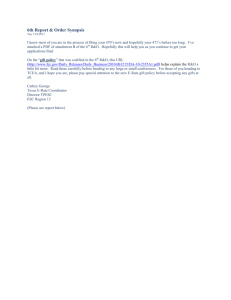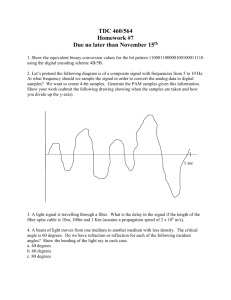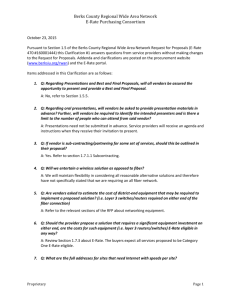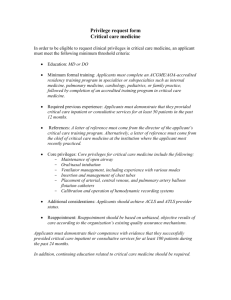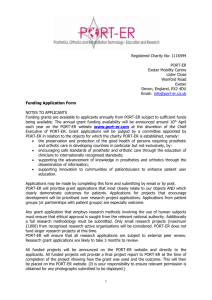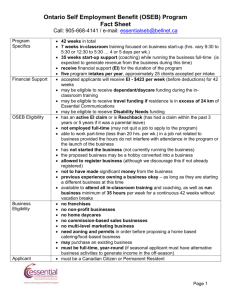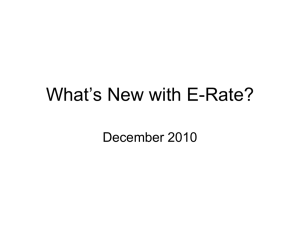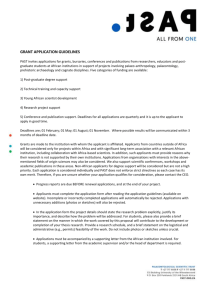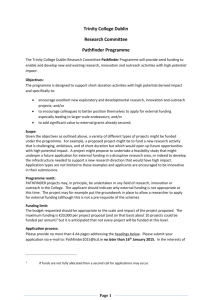FCC Clarifies Changes to the E-Rate Program Announced in Sixth
advertisement
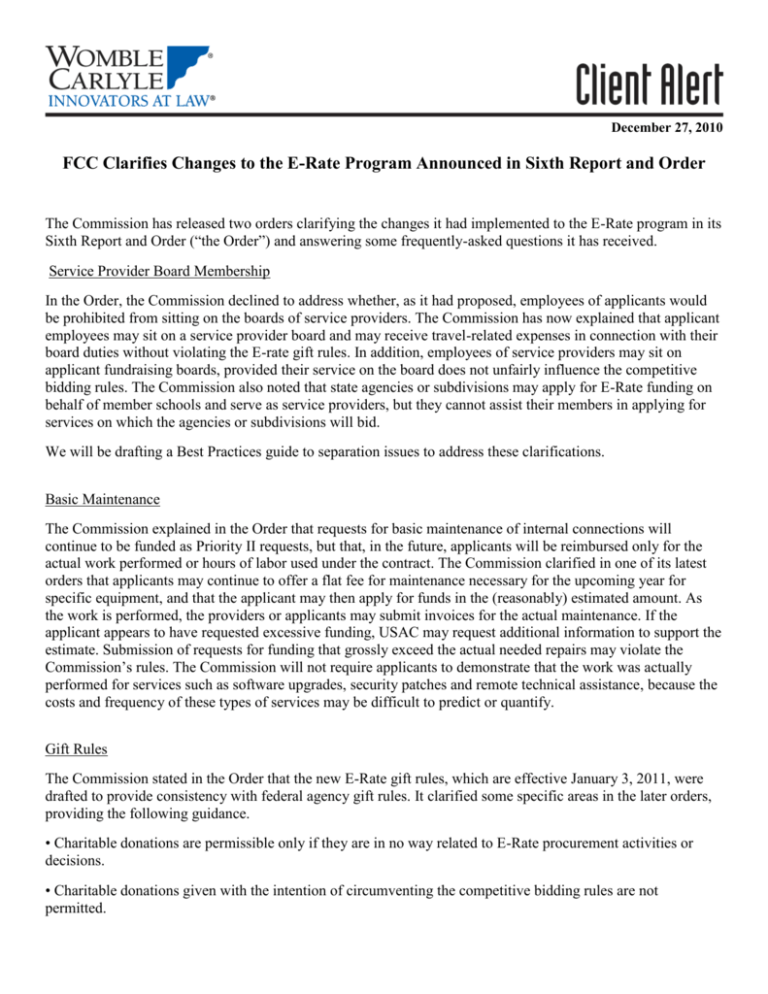
December 27, 2010 FCC Clarifies Changes to the E-Rate Program Announced in Sixth Report and Order The Commission has released two orders clarifying the changes it had implemented to the E-Rate program in its Sixth Report and Order (“the Order”) and answering some frequently-asked questions it has received. Service Provider Board Membership In the Order, the Commission declined to address whether, as it had proposed, employees of applicants would be prohibited from sitting on the boards of service providers. The Commission has now explained that applicant employees may sit on a service provider board and may receive travel-related expenses in connection with their board duties without violating the E-rate gift rules. In addition, employees of service providers may sit on applicant fundraising boards, provided their service on the board does not unfairly influence the competitive bidding rules. The Commission also noted that state agencies or subdivisions may apply for E-Rate funding on behalf of member schools and serve as service providers, but they cannot assist their members in applying for services on which the agencies or subdivisions will bid. We will be drafting a Best Practices guide to separation issues to address these clarifications. Basic Maintenance The Commission explained in the Order that requests for basic maintenance of internal connections will continue to be funded as Priority II requests, but that, in the future, applicants will be reimbursed only for the actual work performed or hours of labor used under the contract. The Commission clarified in one of its latest orders that applicants may continue to offer a flat fee for maintenance necessary for the upcoming year for specific equipment, and that the applicant may then apply for funds in the (reasonably) estimated amount. As the work is performed, the providers or applicants may submit invoices for the actual maintenance. If the applicant appears to have requested excessive funding, USAC may request additional information to support the estimate. Submission of requests for funding that grossly exceed the actual needed repairs may violate the Commission’s rules. The Commission will not require applicants to demonstrate that the work was actually performed for services such as software upgrades, security patches and remote technical assistance, because the costs and frequency of these types of services may be difficult to predict or quantify. Gift Rules The Commission stated in the Order that the new E-Rate gift rules, which are effective January 3, 2011, were drafted to provide consistency with federal agency gift rules. It clarified some specific areas in the later orders, providing the following guidance. • Charitable donations are permissible only if they are in no way related to E-Rate procurement activities or decisions. • Charitable donations given with the intention of circumventing the competitive bidding rules are not permitted. • Service providers cannot offer discounts on equipment with service arrangements to E-Rate applicants unless they are made available to other subscribers. • Certain gifts, such as cash, travel and equipment provided for individuals associated with an E-Rate participant, indicate, by their very nature, undue influence of the service provider and are presumptively prohibited. • Gifts are not prohibited if they are de minimis (worth under $20), result from personal relationships or outside business relationships, or are meant to honor an award recipient. • Service providers may sponsor an E-Rate-related conference, seminar or training session (including food, refreshments, instruction and documents provided to participants) if all other E-Rate program gift rules are followed by the parties. • Service providers cannot solicit attendance or pay an attendance fee of an employee of an E-Rate applicant to speak at the service provider’s conference or other event to promote the use of the service provider’s E-Rate eligible services. Community Use The Commission reiterated in its latest order that applicants may decide whether to open their schools up for community use after hours. Such a decision should be made by the “appropriate local administrative authority,” a status which could vary between districts. Under no circumstances, however, may schools allow community use of their facilities to interfere with student use of services during school or after-school programs. Schools may open their doors during the school year or during the summer months, but only during non-operating hours. These hour restrictions also apply to non-instructional facilities, such as administrative offices. The Commission explained that a college may utilize a school’s network for classes and still charge for the cost of instructors and other expenses, so long as they are specifically not charging for Internet access. Dark Fiber Dark fiber is an eligible, Priority I service for Funding Year 2011, and maintenance of leased dark fiber outside of the school property line is eligible as a Priority I service. Leased dark fiber must be lit during the funding year in which it is requested to be eligible. The Commission will not pay for charges until the service is lit. The Commission has clarified that, when dark fiber will not be lit by the beginning of the funding year, applicants must file one funding request for the service that is in operation at the beginning of the year and another for the dark fiber service. However, an applicant cannot receive E-Rate funding for duplicative services. Therefore, once the applicant begins to use that service, it can receive funding only for the newly-lit dark fiber. If the fiber serves multiple customers, the cost of maintenance should be shared among all the recipients. In the Order, the Commission stated that some charges for dark fiber installation are ineligible. It has now given specific instruction on the eligibility of particular components. Construction of dark fiber is only eligible as a Priority I service within property lines of the applicant. Modulating equipment is eligible only on on-premise dark fiber (as Priority II). On-premise fiber between two school buildings is eligible as a Priority II service. The Commission has now clarified that, while the prices of eligible goods and services must be the primary factor in any bid selection, the ineligible costs of construction may be considered as a separate factor. The Commission encouraged applicants to submit an FCC Form 470 under both telecommunications and Internet Access categories for dark fiber service. If the applicant receives the dark fiber (and no other services) from a telecommunications provider, the provider should be noted as providing Internet Access on the Form 471. Otherwise, the type of category will be defined by the status of the provider. In the Order, the Commission stated that excess capacity is not eligible. The Commission clarified that its intention was to ensure that E-Rate discounts weren’t given for acquiring dark fiber for future use. Therefore, upfront installation charges that are not related to how much fiber is lit are eligible. However, recurring charges for leased dark fiber are eligible only for dark fiber that has been lit within the year. SPIN Changes In the Order, the Commission explained that an applicant may change providers from a service provider selected through the competitive bidding process only if the applicant has a legitimate reason to do so (e.g., breach of contract) and the newly selected provider received the next highest point value in the original bid evaluation. The Commission has now clarified that, if the applicant only received one bid in the bid evaluation, the applicant may still select a substitute provider if it has a legitimate reason, but the substitute provider may not be paid more than the funding amount originally requested. Applicants who receive no bids in the competitive bidding process do not have to submit another Form 470, but instead can select a provider in compliance with their state and local competitive bidding rules. The Commission also clarified that the SPIN change requirements given in the Order also apply to contracted services, month-to-month services and tariffed services. Technology Plans The Commission no longer requires that applicants show that they have the budget necessary to fund nondiscounted elements of a technology plan. The Commission has clarified that applicants still must be able to demonstrate that (1) they are paying their non-discounted share of the services and (2) they have the resources to utilize E-Rate services. The Commission also explained that there is no FCC technology plan requirement for Priority I applicants in Funding Year 2011, and that the Commission will never enforce state technology plan requirements. All clarifications and changes discussed herein are effective for Funding Year 2011. If you have any questions, please contact Mark Palchick, Sarah Miller, or one of our other Womble Carlyle Telecommunications professionals. Mark Palchick (202) 857-4411 mpalchick@wcsr.com Sarah Miller (202) 857-4448 sarmiller@wcsr.com Womble Carlyle client alerts are intended to provide general information about significant legal developments and should not be construed as legal advice regarding any specific facts and circumstances, nor should they be construed as advertisements for legal services. IRS CIRCULAR 230 NOTICE: To ensure compliance with requirements imposed by the IRS, we inform you that any U.S. tax advice contained in this communication (or in an attachment) is not intended or written to be used, and cannot be used, for the purpose of (i) avoiding penalties under the Internal Revenue Code or (ii) promoting, marketing or recommending to another party any transaction or matter addressed in this communication (or in any attachment).
